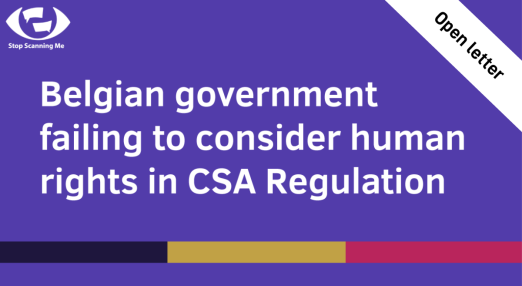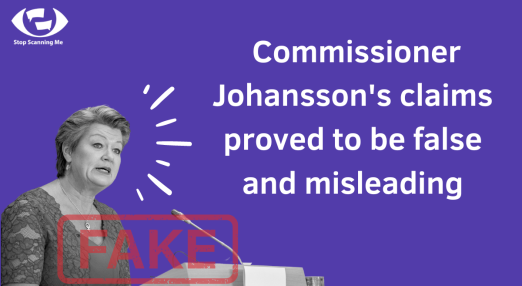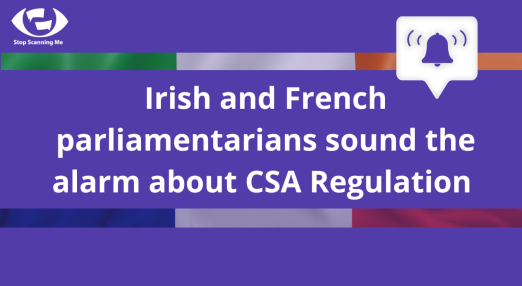Spotify gets fine of € 5 Million for GDPR violations
Following an EDRi member noyb complaint and litigation over inactivity, the Swedish Data Protection Authoirty (IMY) has issued a fine of 58 Mln Swedish Crown (about € 5 Million) against Spotify.
Filter resources
-

Spotify gets fine of € 5 Million for GDPR violations
Following an EDRi member noyb complaint and litigation over inactivity, the Swedish Data Protection Authoirty (IMY) has issued a fine of 58 Mln Swedish Crown (about € 5 Million) against Spotify.
Read more
-

Warnings from the UK: 24/7 racialised GPS surveillance
Campaigners assembled outside Capita PLC’s Annual General Meeting in the City of London on Thursday 11 May are contesting the outsourcing company’s £114m contract to deliver 24/7 GPS monitoring services, used by the Home Office to surveil people without British citizenship.
Read more
-

Snowden revelations: ten years on
Ten years ago, the first revelations about US mass surveillance were published in the UK and USA. The revelations swiftly widened to encompass details about the role of the UK’s GCHQ (Government Communications Headquarters) in the global gathering of vast amounts of communications data.
Read more
-

The Belgian government is failing to consider human rights in CSA Regulation
Despite the clear warnings, Belgium has taken a position calling on the EU to adopt the CSA regulation as quickly as possible, dismissing the technical problems, and without addressing the serious legal concerns that have been raised.
Read more
-

Romania: CSA Regulation will make journalistic investigations of child abuse impossible
The back door to people’s private communications that only the authorities can access is a mythical creature that lives in the imagination of those dismissing the consequences of malware, spyware attacks and software exploits. Experts and affected people have spoken up about the dangers of creating a back door to secure communication even if it is to be accessed only by police and security services. The Child Sexual Abuse (CSA) Regulation has revived the age-old debate.
Read more
-

Commissioner Johansson cannot be trusted with the EU’s proposed CSA Regulation
In the midst of a wide range of concerning practices and behaviours, EDRi has found it necessary to raise a formal complaint against the EU’s Home Affairs department for possible breaches of independence.
Read more
-

The CSA Regulation: how did it reach this point?
How did we reach this point of even discussing a law (Child Sexual Abuse Regulation) that so manifestly undermines our democratic structures, threatens to override the fundamental rights that generations have been fighting for, and ignores solid evidence and unanimous professional expertise?
Read more
-

Do you trust the police? CJEU Advocate General accepts access to phones for any type of crime
In its opinion on the Bezirkshauptmannschaft Landeck case, the Advocate General of the European Court of Justice is failing to suggest adequate safeguards for police access to our smartphones.
Read more
-

PEGA Committee does not go all the way on spyware regulation
On 8 May 2023, the Committee of Inquiry of the European Parliament investigating the use of Pegasus and equivalent surveillance spyware (PEGA) adopted its final report and recommendation, after 14 months of hearings, studies and fact-finding missions.
Read more
-

LIBE lead MEP fails to find silver bullet for CSA Regulation
On 19 April 2023, the lead MEP on the proposed CSA Regulation, Javier Zarzalejos (EPP), published his draft report. Whilst we agree with MEP Zarzalejos about putting privacy, safety and security by design at the heart, many of his changes may pose a greater risk to human rights online than the European Commission’s original text.
Read more
-

Where artificial intelligence and climate action meet
The use of artificial intelligence (AI) has a major influence on climate action, climate change mitigation and the work of environmental defenders. It offers potential benefits, for example when it is used to enhance high-resolution mapping of deforestation, coral reef loss, and soil erosion. On the other hand, it poses a threat to the climate and its defenders when it leads to extraction of natural resources and when automated online surveillance is used to enhance the power of states and corporations to suppress climate activism and grassroots resistance.
Read more
-

Irish and French parliamentarians sound the alarm about EU’s CSA Regulation
The Irish parliament’s justice committee and the French Senate have become the latest voices to sound the alarm about the risk of general monitoring of people’s messages in the proposed Child Sexual Abuse (CSA) Regulation.
Read more
